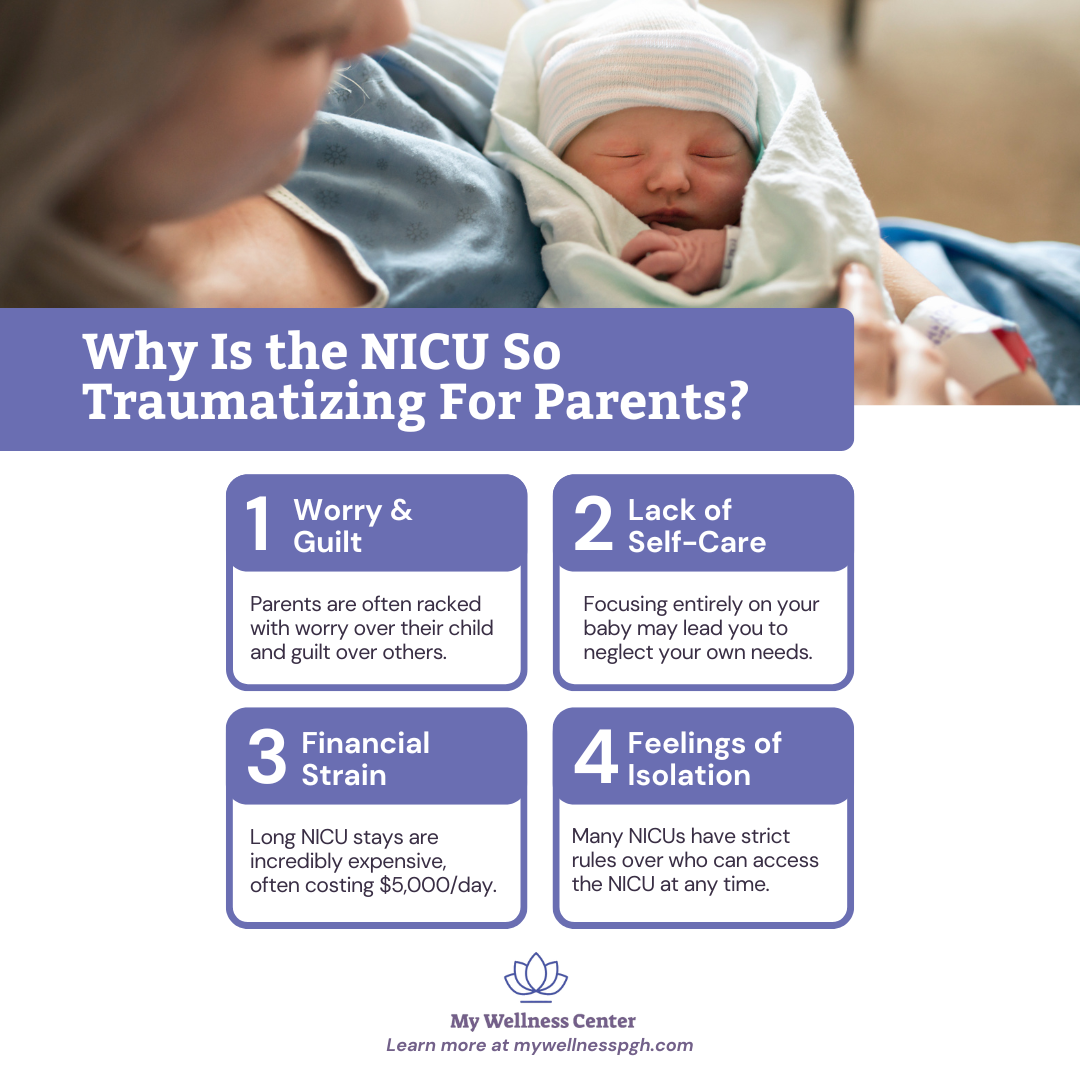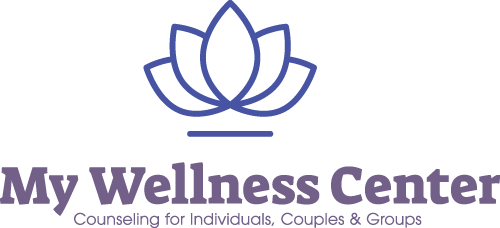Having a baby is supposed to be a celebratory experience. But when there are complications, a newborn is often isolated in the NICU—which can become a traumatizing experience for parents.
That’s why NICU parent support is so important. When a newborn enters the neonatal intensive care unit, life feels like it comes to a standstill, but the rest of the world keeps on moving.
Read our full blog post to learn the best steps forward—as a parent, family member, or friend.
Table of Contents
Therapy for NICU Parents
Find A NICU Parent Network
How to Support A NICU Parent
FAQ About NICU Parents and NICU Parent Support
Therapy for NICU Parents
One of the best forms of NICU parent support is therapy. A NICU stay is stressful for everyone—the baby, the parents, and the rest of the family. Without addressing this trauma, multiple family members could experience long-term health issues.
Let’s dig in:
Why Is the NICU So Traumatizing?
There are a few reasons why stints in the NICU are so traumatizing:
1. Worry and guilt. It’s natural for parents to worry while suffering through a stay at the NICU, but many are surprised they also feel waves of guilt. For example, they may feel:
- Guilty when seeing other parents with children who are even sicker than their own.
- Guilty when leaving other kids at home while they’re at the hospital for long stretches of time.
- Guilt and sympathy for the babies who don’t have parents or family members showing up to support them.
- Guilt among mothers for feeling like their bodies failed them during the pregnancy.
2. Lack of self-care. Spending extended periods of time in the NICU forces you to cut out other important elements of your life, and that could cause you to swap healthy, nutritious meals for pre-packaged, ready-to-eat snacks from vending machines and fast food restaurants.
Although these meals are convenient, they can cause weight gain, mood swings, and health issues—all of which can interfere with your responsibilities in the NICU and other areas of life.
3. Financial strain. Long hospital stays in the NICU are incredibly expensive, with many stays costing $3,000–$5,000 per day, according to the National Library of Medicine.
Even with only a week in the NICU, parents could be straddled with an extra $35,000 in medical costs.
But it doesn’t end there. Some parents must take off work to care for their child, and that loss of income makes the medical bills even more painful.
Worse, ongoing at-home care for your child could involve special medical equipment, medication, and visits from nurses and doctors—all of which can be incredibly expensive without excellent insurance coverage.
4. Feelings of isolation. Most hospitals have strict rules over the number of people allowed to see NICU babies, and that may mean you can only visit your child with your spouse—not a grandparent, brother, sister, or anyone else.
Sitting alone beside an incubator can be a terrifying experience, especially when your child is critically ill.
And these feelings can continue long after the NICU stay is over. If the child is immunocompromised or experiences a life-long illness, your family may need to make special sacrifices. That could include:
- A lack of pets and visitors to avoid extra germs.
- A lack of travel to avoid additional stress—or because it’s too costly or difficult with medical interventions.
- An inability to go out for a date because of responsibilities at home.

Why Is Therapy for NICU Parents So Important?
A NICU stay doesn’t just affect the baby—it changes the entire family dynamic. Parents often carry invisible scars from the experience, and without therapy, those scars can linger for years. Here’s why seeking help matters:
- Processing trauma: The NICU is filled with alarms, urgent medical conversations, and life-or-death decisions. Therapy provides a safe place to process these overwhelming emotions before they harden into long-term anxiety, PTSD, or depression.
- Strengthening relationships: Stress often spills over into marriages and family life. Therapy helps couples and families learn to communicate openly, manage stress together, and avoid long-term rifts caused by the NICU experience.
- Reducing guilt and self-blame: As we mentioned earlier, many parents wrestle with guilt—wondering what they could have done differently during pregnancy or delivery. A therapist can help reframe these thoughts and provide healthier coping strategies.
- Protecting long-term health: Unchecked stress increases the risk of sleep issues, high blood pressure, substance use, and other chronic conditions. Therapy supports both emotional and physical wellness by teaching resilience and stress-management skills.
For many NICU parents, therapy isn’t just about surviving the present moment—it’s about laying the foundation for a healthier future for themselves and their family.
Find A Therapist for NICU Parents
The team at My Wellness Center has years of experience with at-risk births, new parents, and NICU families. In fact, our founder, Tomi Ward, once specialized in assisting low-income pregnant women, and she has even worked as a birth doula.
Contact us for a consultation and to connect with a therapist who’s right for you.
Learn more about Pittsburgh birth support resources through the MAYA Organization.
Find A NICU Parent Network
Even the strongest parents need a village. NICU parent networks provide understanding, empathy, and resources that friends outside the hospital may not fully grasp. These networks can be a lifeline in both the short and long term.
Resources to check:
- Hospital-based networks: Many NICUs run their own peer support groups, pairing new parents with those who have already gone through the experience. Ask your nurse, social worker, or case manager for connections.
- Nonprofit organizations: Some organizations run online and in-person programs designed specifically for NICU parents. These communities provide emotional support, resources, and mentorship opportunities.
- Local community groups: Some churches, community centers, or mental health practices help connect families with others who have shared similar journeys.
- Online support groups: For parents with limited time or strict visitation rules, online forums and social media groups offer 24/7 connection. These digital spaces can be a powerful reminder that you’re not alone, even when physically isolated.
By joining a NICU parent network, families gain encouragement, advice, and solidarity from others who truly “get it.” It’s a reminder that healing happens not only in the hospital, but also in the community.
How to Support A NICU Parent
NICU parents are often so overwhelmed, they’re not even sure where they need the most support. Sometimes, the best thing to do is fill a void without being asked to.
That could mean:
- Offering to handle the household laundry or cleaning once a week.
- Offering to handle meals for the household—or starting a meal train to coordinate regular drop-offs of home cooked meals for the family.
- Offering to get their kids off the bus after school and look after them until the parents return from the NICU.
- Offering to go grocery shopping for the family.
- Listening to them detail their journey—and be a supportive friend in this time of need.
Tip: Think about the parent’s lifestyle and where they need the most support, then offer to help.
FAQ About NICU Parents and NICU Parent Support
Where can you find a NICU parent network?
Your hospital may have a network of fellow NICU parents who offer ongoing support and encouragement. However, you can also find support in your church, local mom groups, and other resources.
What’s the best way to support NICU parents?
The best way to support NICU parents is to identify where they’re struggling in life. They could benefit from having someone clean the house, filling their fridge with ready-to-eat meals, or watching their other children after school.
When parents spend the day at the hospital, it’s difficult to keep up with the rest of society and domestic responsibilities.
What are good gifts for NICU parents?
As we mentioned above, good gifts for NICU parents often aren’t traditional presents like clothing and bottles. They may be more thankful for gifts and favors that lend support in other areas of their lives, such as:
- Taking care of their lawn or landscaping
- Cleaning their home
- Cooking meals
- Watching the rest of their children
- Lending support with transportation
- Going grocery shopping
What’s a short prayer for NICU parents?
If you find comfort in religion, here’s a short prayer from Chaplain Christine Wagner-Hect at the University of Iowa Healthcare:
Oh, God, we didn’t want to be here yet. We don’t know what will happen. We don’t even know what to ask for but for your help. Right now that’s what we know to ask for: your help. This baby, mine, ours, a child or children, more than one for whom we have longed for and prayed. Breathe with us, help us to hold on, breathe with us. Help us. Be here with us. Amen.
You can find more prayers on the Preemie Prayer Wall.

